Do French Bulldogs Shed? [Which Types Shed]
There is a misconception that dogs with shorter coats don’t shed. This is not true.
All dogs shed, even the short-coat breeds, so it is just a matter of knowing which breeds shed more.

An example would be the French Bulldog. They have short, silky, and shiny coats. Their gleaming coats and adorable bat-ears make them one of the best-looking breeds in the world.
But they, too, shed and have their hair issues. So if you want to get a French Bulldog entirely because you think it doesn’t shed, it is time to reconsider.
The French Bulldog
According to the American Kennel Club, the French Bulldog, nicknamed the “Frenchie,” is ” America’s fourth most popular breed. This breed is loyal, ideal for families with kids, and is endearing.
They are affectionate and can catch the attention of other people. Frenchies are not barkers, but they are almost always alert, making them perfect watchdogs.
The French Bulldog is an ideal indoor pet, and they won’t ask much of your time for outdoor exercises. Naturally charming, this breed usually comes in cream, white, and fawn coloring. They have dark brown eyes and that “squished up” goofy face.

Do French Bulldogs Shed?
Yes, like all dogs, French Bulldogs shed. But the good news is as Frenchies only have fine and short hair, their shedding is minimal.
You don’t need to worry about a trail of hair everywhere because they don’t have that amount of hair to lose and leave behind.
Frenchies shed to get rid of the old and damaged hair. This allows a healthier new coat to develop.
Shedding is also one of the natural ways that your dog adapts and copes with environmental factors like the change of temperature and seasons.
Usually, French Bulldogs start shedding during summer, when the temperatures go up. They feel more relaxed and comfortable with a lighter summer coat. This process of seasonal shedding is called “blowing coat.”
This is also when they get rid of their thin fur, so they can grow a thicker coat once the weather becomes cooler.
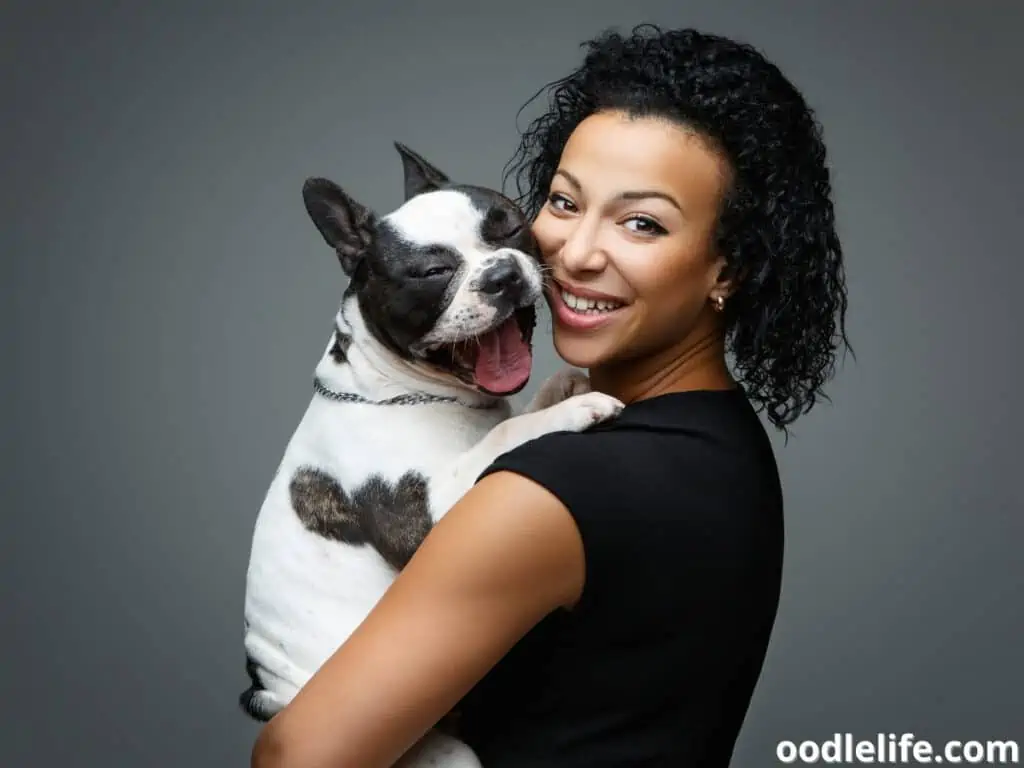
Causes of Shedding for French Bulldogs
While the shedding of French Bulldogs is more tolerable than the German Shepherd and Husky, it can still be a cause of nuisance.
Understanding why your French Bulldog sheds may make you more patient and grateful that you own Frenchie and not other heavy shedding dog breeds.
1. The Weather
As mentioned above, French Bulldogs start shedding during summer and then again, at the beginning of winter.
During summer, your Frenchie loses its undercoat for relief from the summer heat, and when winter comes, they shed this summer coat to make way for a thicker coat to keep them warm. In areas where the temperatures are constant and mild, you can expect minimal shedding.
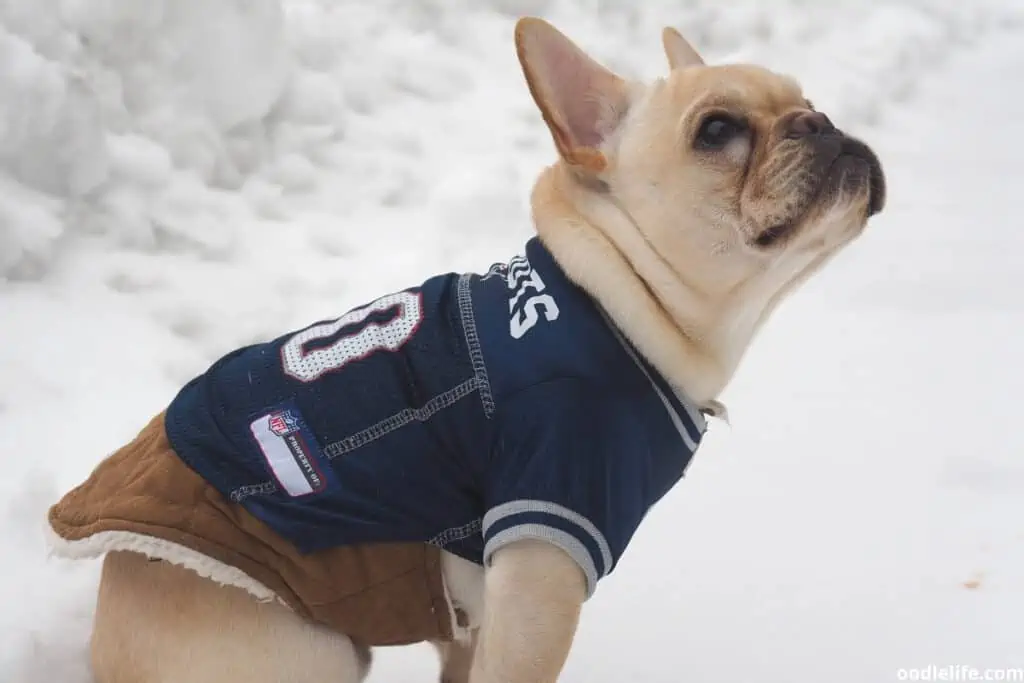
2. Your Frenchie’s Age
Young dogs all go through a shedding phase where they lose their puppy coat. This usually occurs between their fourth and sixth months.
Meanwhile, expect older dogs to shed more due to their size. Either way, shedding is part of a Frenchie’s life, and it is something you need to get used to.
3. Your French Bulldog’s Diet
Jean Anthelme Brillat-Savarin’s famous quote, “Tell me what you eat and I will tell you what you are” is very much applicable to your French Bulldog too.
Healthier food means that you are also fostering a healthier pooch. And a balanced diet with all the needed vitamins and minerals can help your dog’s overall hair health.
Nourish your dog with food rich in collagen, Omega-3, and 4 fatty acids for a healthier and better-looking coat. The hair follicles won’t break off easily, so excessive shedding will no longer be a concern for you.
At the same time, encouraging your dog to be well hydrated translates to healthier skin and less hair loss.
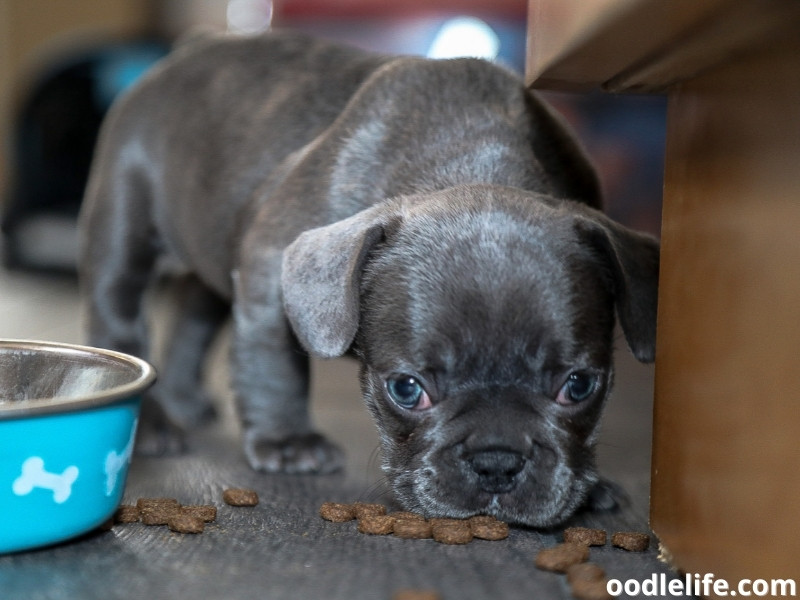
4. Your Dog’s DNA
Your French Bulldog’s genes also influence its shedding, as with all other dogs. In particular, the MC5R-gene is the one impacting how much your French Bulldog will shed.
This genetic material, expressed in your dog’s hair follicles, is responsible for creating sebum. Sebum is an oily substance that ensures that the skin is well-moisturized.
The MC5R-gene comes in two variants, the G and A-type. If your dog carries the G-variant, expect a lot of shedding.
So you can hope that your French Bulldog brings the A-variant, so you don’t need to worry about dealing with plenty of hair.

French Bulldogs: Quantifying the Shedding
How much do French Bulldogs shed? French Bulldogs’ shed is minimal. This is primarily thanks to their small bodies and short coats.
But not all Frenchies are created equal. There are French Bulldogs who have a denser coat and, as a result, would shed more. If you have more than one Frenchie in your household, you can attest to this reality that the shedding, despite being minimal, is still unique and at different levels.
What times of the year do French Bulldogs shed? Some French Bulldogs shed all year long while others, only in-between seasons. The shedding of some Frenchies can almost be unnoticeable, while others leave a trail behind them.
Do French Bulldogs need a haircut? No, they don’t. Thanks to their short coats, they don’t need regular haircuts.
You don’t need to trim their hair; grooming will do!
Possible Reasons Why Your French Bulldog Sheds Too Much
In cases where you see that your supposedly moderately-shedding French Bulldog is shedding too much to the point of having bald spots, then something is off. The shedding can be a symptom of a more serious problem.
Again, Frenchies should only shed moderately, and excessive is a red flag. You need to talk to your vet ASAP.
To give you an idea, though, here are the possible reasons why your Frenchie may be shedding more than usual:
An allergic reaction.
The excessive hair loss may be an effect of your dog being allergic to something like medication, food, shampoo, and even something like a household cleaning material or product.
This might be a little challenging to identify, but pay attention to the recent changes to your dog’s diet, bathing routine, and other lifestyle changes. After these, follow an elimination process and observe if removing one of the possible causes eases your dog’s uncontrollable shedding.
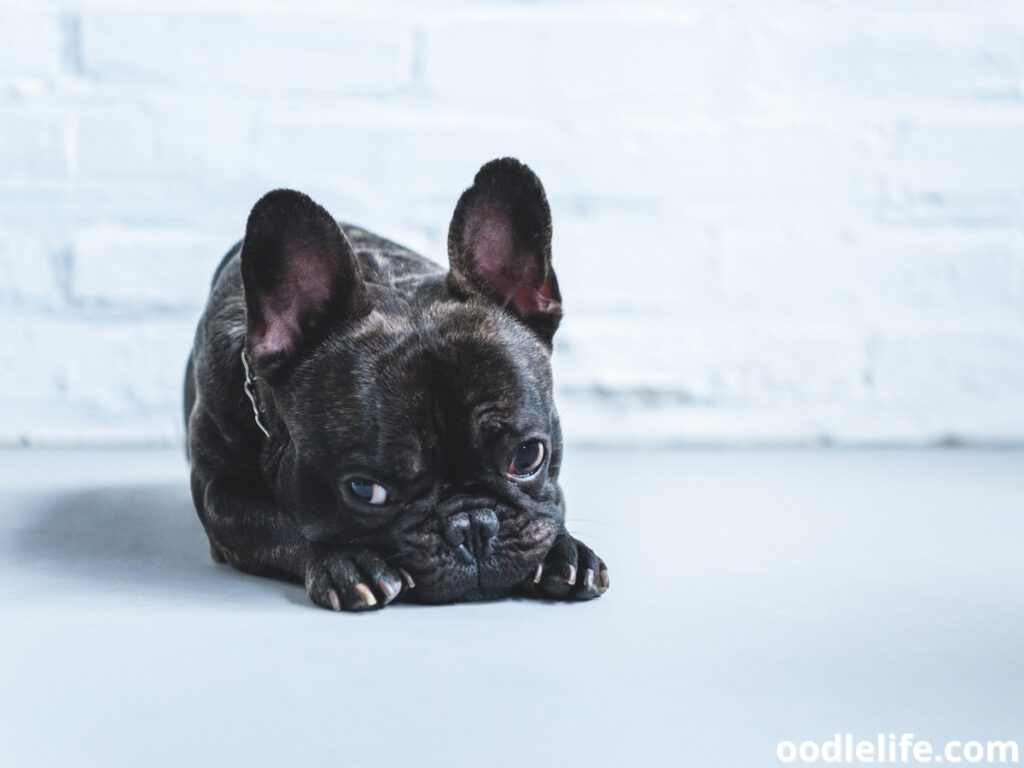
Your dog’s diet.
What your dog consumes is essential for nutrition and has side effects on your dog’s appearance and behavior. If your dog is not getting sufficient nutrition and hydration, it will show in their skin, potentially leading to shedding.
Certain foods can cause shedding, especially if your dog has food allergies or sensitivities. The most common ones are grain, wheat, and corn.
Your dog was sunburned.
Given that the coat of your French Bulldog isn’t that thick, they can get sunburned easily. And this can have a drying and irritating effect on their skin, and one result would be shedding.
So in cases that your Frenchie spends hours under the sun, apply a cold compress to their skin that was overexposed. This will help ease the pain and discomfort, and once the skin is hydrated, you’re back dealing with the regular shedding of your Frenchie.
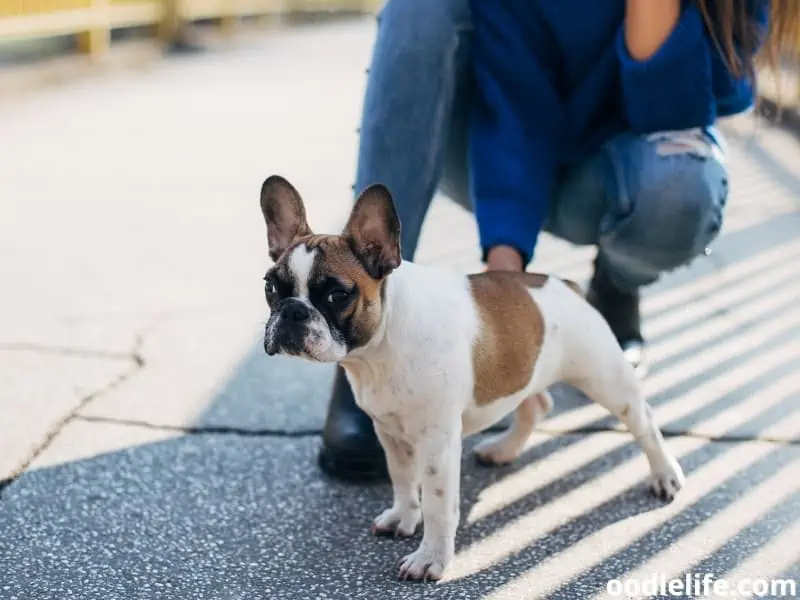
Your dog has an infection
Bacterial and fungal infections like ringworms can also cause your pet to shed more than usual. So if, aside from the hair everywhere, you also notice red patches and pimple-like bumps, redness, and an unpleasant odor on your dog’s skin, head to the vet as soon as you can.
Your dog may have medical concerns.
Excessive shedding is not normal for French Bulldogs, and this might be an indicator of a medical condition. And this is where your vet steps in so a thorough examination, including lab work, can be done.
Some possible diagnoses related to excessive shedding are immune disease, cancer, thyroid, liver, kidney, adrenal disease, and Cushing’s disease.
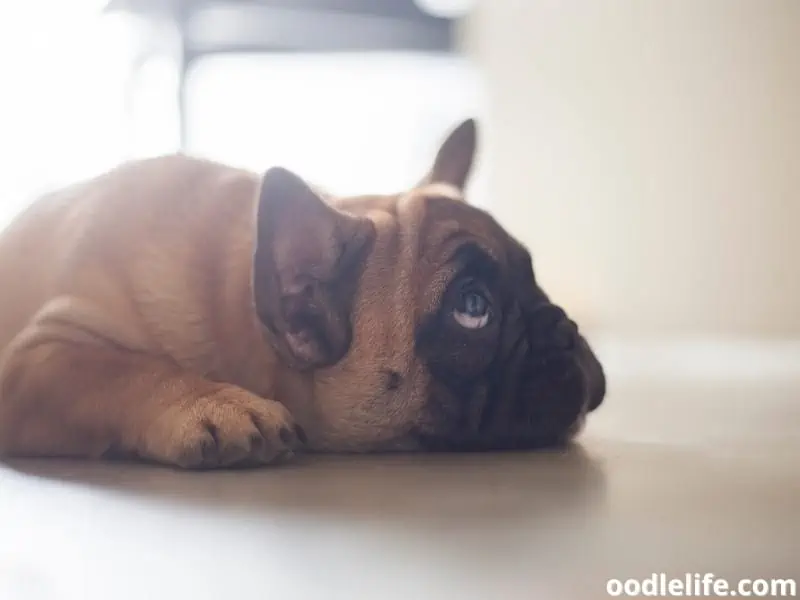
Your dog is stressed.
Hair fall is one indication of stress for you, so why not for your pup? And this stress can be because of sudden changes in your family dynamics and environment, or your dog is going through an emotional struggle.
A Frenchie may show physiological reactions like excessive shedding in response to these stressful situations. Should this be the case, give your Frenchie some extra TLC, attention, and some multivitamins.
Proven Tips to Control Frenchie Shedding
Shedding is natural for your Frenchie—it is part of who they are. But excessive shedding is a complete no-no. Thankfully, you can adopt effective methods to control your French Bulldog’s shedding.
Here’s how to groom a shedding Frenchie:
Pro Tip #1 – Use the right shampoo.
French Bulldogs have sensitive skin, so if you are the kind of owner who loves using different shampoos on your dog, then it’s time that you stop. Stick to a veterinary-approved hypoallergenic shampoo that is intended for sensitive skin.
Don’t go after the scent or a product’s promises of a silkier and shinier coat. Instead, prioritize what the shampoo can do to your Frenchie’s actual skin. You can explore other organic product alternatives.
You can also try bathing salts. When you try this option, make sure you use one that doesn’t sting the eyes and is meant for dogs with sensitive skin.
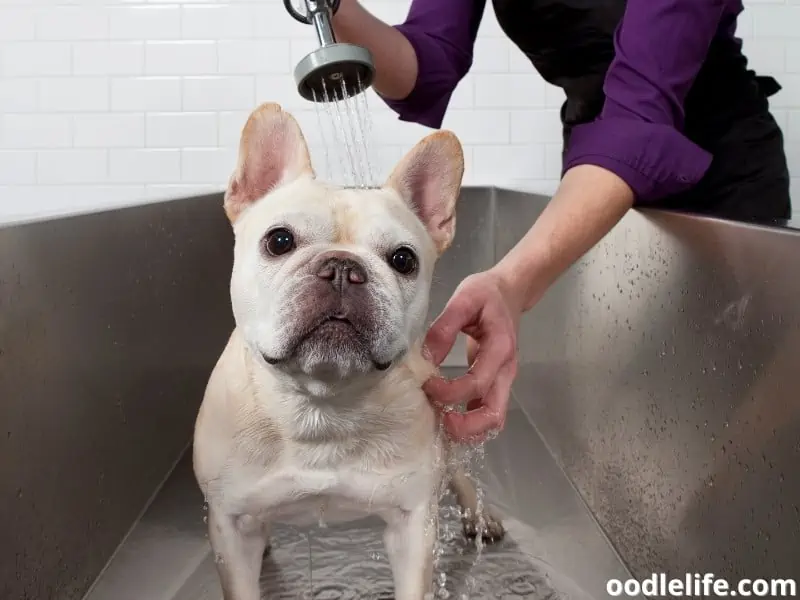
Pro Tip #2 – Invest in the proper grooming brush.
When you go to the pet store, you will see different kinds of brushes. They may promise to be the best choice for your dog. You have to be a smart shopper and an even smarter Frenchie parent.
French Bulldogs are not too demanding when it comes to their grooming needs. Combing their fur at least once a week is enough to keep the mats and tangles at bay. And since Frenchies have their signature shirt coats, you don’t need those stiff brushes that are somewhat uncomfortable and even painful.
A grooming glove is a good choice. This grooming tool is usually made of silicon, and you can be sure it picks up any loose fur that it passes through like a magnet. You can use the same grooming glove to give your Frenchie a little TLC massage.
Pro Tip #3 – Always dry your French Bulldog’s fur.
After bathing, make sure that your dog’s fur is dry. You don’t need a hairdryer or blower for this. In fact, its loud noise may stress your Frenchie and scare it.
Instead, you can use a unique microfiber towel that is designed to absorb the water from your dog’s coat fully. You can use the same towel to clean your pet’s paws, too.
This is a better choice compared to cotton-made towels because not only is it effective in drying your Frenchie’s dog, but it can also pick dead hair and dirt.
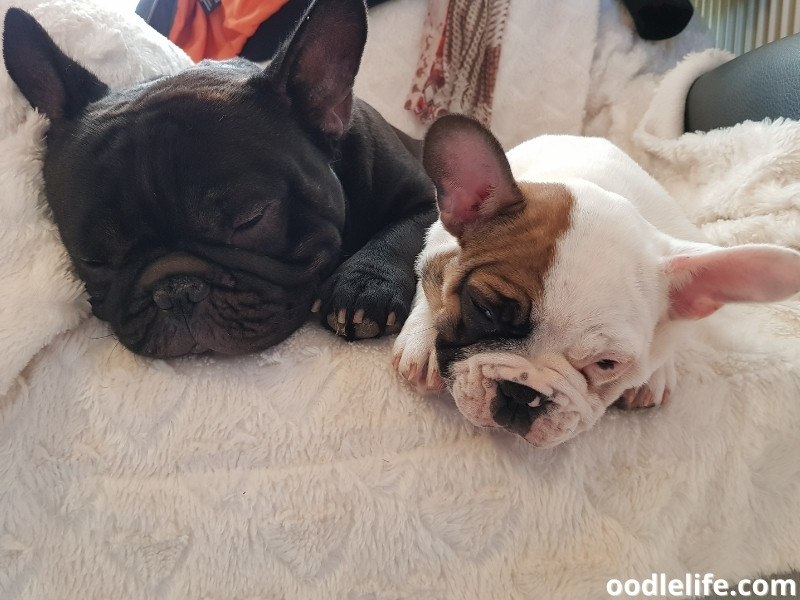
Pro Tip #4 – Provide supplements.
Fish oil, brewer’s yeast, and flax oil are effective supplements that can reduce your French Bulldog’s shedding. These supplements can help alleviate symptoms of inflammation and, at the same time, promote healthier undercoat growth.
Pro Tip #5 – Consult your vet.
Don’t self-medicate or wait until your Frenchie starts sporting numerous bald spots. When in doubt or have any questions, talk to your vet.
Your vet can ease your worries, provide the right management plan for your French dog, and be with you every step of the way.
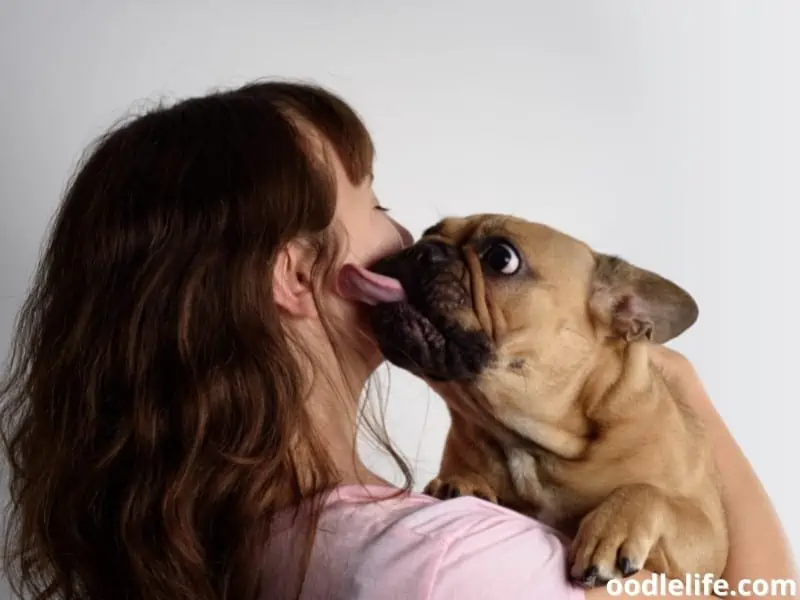
Conclusion
Despite their shedding, French Bulldogs, without a doubt, are one of the most adorable breeds around. Shedding is part of being a Frenchie, so as a pet owner, you have to accept it and deal with it the best way you can.
If the shedding is beyond normal, ensure your dog is not having an allergic reaction or an infection. Also, take a look at your dog’s diet and add the appropriate amounts of vitamin and mineral supplements it requires to its meals.
Keep an eye on your dog’s bathing and grooming, and if you think it is already extensive, get the assistance you need from a vet.
